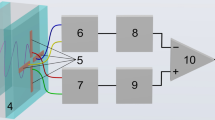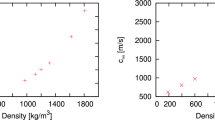Abstract
As is now well known, examination by means of a Fabry-Perot étalon reveals remarkable changes in the spectral character of monochromatic radiation when it is scattered within a dust-free liquid. Earlier studies in this laboratory1 disclosed that the relative intensity of the undisplaced central line to that of the two Doppler-shifted companions appearing on either side of it varies greatly from liquid to liquid, being for example much larger in carbon tetrachloride than in toluene. The origin of the undisplaced central line has been until now one of the unsolved problems of the subject; its high intensity in the case of carbon tetrachloride and its practically complete polarization in this liquid as well as in toluene and carbon disulphide indicate that it cannot be ascribed to the depolarized scattering by optically anisotropic molecules.
This is a preview of subscription content, access via your institution
Access options
Subscribe to this journal
Receive 51 print issues and online access
$199.00 per year
only $3.90 per issue
Buy this article
- Purchase on Springer Link
- Instant access to full article PDF
Prices may be subject to local taxes which are calculated during checkout
Similar content being viewed by others
References
Raghavendra Rao B. V., Proc. Ind. Acad. Sci., (A), 1, 261, 473 and 765 (1934–35); 2, 236 (1935); 3, 607 (1936).
Author information
Authors and Affiliations
Rights and permissions
About this article
Cite this article
RAMAN, C., RAGHAVENDRA RAO, B. Acoustic Spectrum of Liquids. Nature 139, 584–585 (1937). https://doi.org/10.1038/139584b0
Issue Date:
DOI: https://doi.org/10.1038/139584b0
This article is cited by
-
Interferometric studies of light scattering in viscous liquids and glasses
Proceedings of the Indian Academy of Sciences - Section A (1942)
-
Debye Heat Waves in Highly Viscous Liquids
Nature (1938)
-
Specific heats of liquids in relation to Raman effect data
Proceedings of the Indian Academy of Sciences - Section A (1938)
-
The dispersion of the ultrasonic velocity in liquids
Proceedings of the Indian Academy of Sciences - Section A (1938)
Comments
By submitting a comment you agree to abide by our Terms and Community Guidelines. If you find something abusive or that does not comply with our terms or guidelines please flag it as inappropriate.



